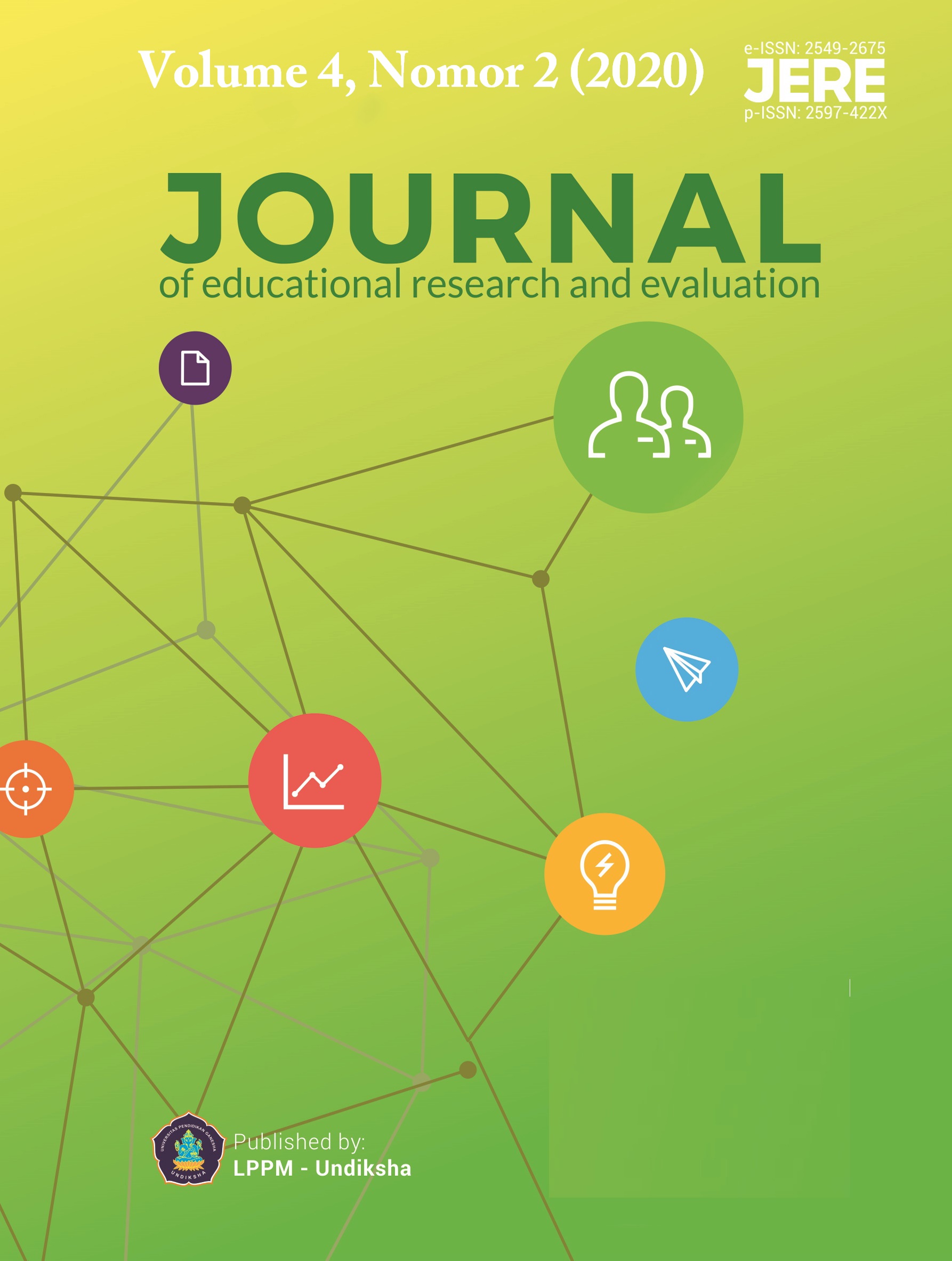Development of Instructional Media “Game Math Comic Story” Based Android on Number
DOI:
https://doi.org/10.23887/jere.v4i2.22370Keywords:
Development of instructional media, comic games, numberAbstract
This research was conducted with the purpose to produce mathematics instructional media based game and comic stories for android. This study aimed at assisting students in studying number material and increasing reading interest for 7th grade students. Media developed were stories that were made into an adventure game made with "appsgeyser.com". The research method was research and development. The development of this medium used 4D (Four-D) development techniques consisting of Define, Design, Develop, and Disseminate stages. To obtain quality media, validation and experiment were done. The result of this study indicated that mathematics instructional media comic game story based android could improve the positive nature and spirit of students in learning. The validity value of media was 3.2 and the practical value of media was 3.14
References
Miller, E. & Kuhanech, H.(2008). Children's perception of play experiences and the development of playpreferences: a qualitative study. American Journal of Occupational Therapy, vol. 62, no. 4, pp. 407-415,.
Sanford, K. (2015). Serious games: video games?. E-Learning and Digital Media, vol. 12, no. 1, pp. 90-106,
Plass, J. Homer, D.& Kinzer, C. (2015). Foundations of Game-Based Learning. Educational Psychologist. vol. 50, no. 4, pp. 258-283,.
Shaffer, D. Halverson, R. & Squire, K. (2005). Video games and the future of learning, Wisconsin Center for Education Research, Wisconsin-Madison.
Chang, Wen-Chih, Wang, Te-Hua, Lin, H. Freya, Yang & Hsuen-Che. (2009). Game Based Learning with Ubiquitous Technologies. IEEE Internet Computing. vol. 13, no. 4, pp. 26-33,.
Kirriemuir, J. & McFarlane, A.(2004). Literature review in games and learning, Futurelab rerieved from
http://www.futurelab.org.uk/document/lit_reviews/Games_Review.pdf,
Pérez, E., Duque, A. & García, L. (2018). Game-Based Learning: Increasing the Logical-Mathematical. Journal Of New Approaches In Educational Research. vol. 7, no. 1, pp. 31-39,
Kamnardsiri, T., Hongsit, L. , Khuwuthyakorn, P. & Wongta, N.( 2017). The Effectiveness of the Game-Based Learning System for the. The Electronic Journal of e-Learning. vol. 15, no. 4, pp. 283-296,
Mavridis, A., Katmada A. & Tsiatsos, T. (2017). Impact of online flexible games on students’ attitude,” Education Tech Research Dev. v65 n6 p1451-1470.
Tham, R. &Tham, L.(2014). The Effectiveness of Game-based Learning. International Jl. on E-Learning, vol. 13, no. 4, pp. 483-496,.
Su, C. & Cheng, C. (2013). 3d Game-Based Learning System For Improving Learning Achievement In Software Engineering Curriculum. TOJET: The Turkish Online Journal of Educational Technology, vol. 12, no. 2, pp. 1-12.
Ozdemir, E. (2017). Comics in modern physics: Learning blackbody radiation through quasi-history of physics. Studies in Educational Research and Development, vol. 1, no. 1, pp. 41-59.
Jacob, D. (2007). More than Words: Comics as a Means of Teaching Multiple Literacies. The English Journal, vol. 96, no. 3, pp. 19-25.
Affeldt, F. Meinhart, D. & Eilks, I.(2016). The Use of Comics in Experimental. International Journal of Education in Mathematics, Science and Technology. vol. 6, no. 1, pp. 93-104.
Krusemark, R. (2016). Teaching with Batman and Sherlock: Exploring student perceptions. Creighton Journal of Interdisciplinary Leadership, vol. 2, no. 1, pp. 71-92.
Sockman, B. Sutton, R.& Herrmann, M. (2016). Comic Relief: Graduate Students Address Multiple Meanings. TechTrends Springer. 60(5).
Downloads
Published
How to Cite
Issue
Section
License
Authors who publish with the Journal of Evaluation and Research in Education (JERE) agree to the following terms:
- Authors retain copyright and grant the journal the right of first publication with the work simultaneously licensed under a Creative Commons Attribution License (CC BY-SA 4.0) that allows others to share the work with an acknowledgment of the work's authorship and initial publication in this journal.
- Authors are able to enter into separate, additional contractual arrangements for the non-exclusive distribution of the journal's published version of the work (e.g., post it to an institutional repository or publish it in a book), with an acknowledgment of its initial publication in this journal.
- Authors are permitted and encouraged to post their work online (e.g., in institutional repositories or on their website) prior to and during the submission process, as it can lead to productive exchanges, as well as earlier and greater citation of published work. (See The Effect of Open Access)











